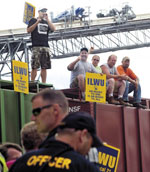
Showdown on West Coast Docks: The Battle of Longview
(November 2011).
click on photo for article
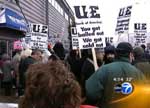
Chicago Plant Occupation Electrifies Labor
(December 2008).
click on photo for article
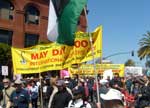
May Day Strike Against the War Shuts Down
U.S. West Coast Ports
(May 2008)
click on photo for article

September 2023
For an All-Out Auto Strike
to Shut Down the Big 3
Junk
the Tiers – Top Pay Rate for All
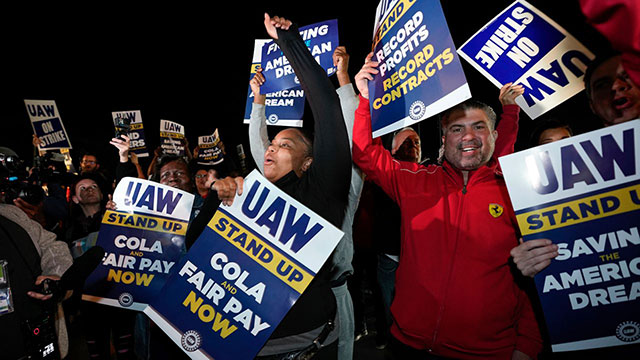
Striking United Auto Workers picket at Ford assembly plant in Wayne, Mich., shortly after midnight Friday, Sept. 15. (Photo: Paul Sancya/AP)
Restore Full Pensions and Health Coverage! Real COLA, Based on Union Figures!
Break with the Bosses’ Parties – For a Class-Struggle Workers Party!
A condensed version of this article was issued as an Internationalist leaflet (click on illustration below to download a pdf copy).
SEPTEMBER 14 – The working people who make this country run are hurting, bad, while the exploiters who live off our labor are making out like bandits. A showdown with the “Big Three” auto companies offers a chance to launch an offensive of militant class struggle to undo decades of union defeats that have led to the present obscene level of inequality, unparalleled since the late 1920s. But to wage and win such an offensive requires a program and leadership prepared to take on the bosses, their parties (Democrat and Republican) and their government.
Ever since the COVID pandemic, U.S. corporations have been raking in eye-popping profits as household incomes are slashed. Last year, the drop in real wages (deducting for inflation) was the largest since the 2007-09 economic crisis. It was the third year in a row that workers’ pay has fallen. This stark fact has driven demands for sharply higher wages in major union contracts. The big business press worried about – and many workers hoped for – a “summer of strikes.” It didn’t happen. Why not? A sellout labor bureaucracy that wants to play ball with the bosses.
The Hollywood writers and actors unions walked out, and are still out after months on the picket lines. But the Teamsters caved, settling with UPS for a contract that left part-time workers still toiling for poverty pay. ILWU West Coast dock workers, meanwhile, after working without a contract for a year, agreed to a deal that let maritime bosses introduce job-killing technology in exchange for union jurisdiction on the docks. Now a strike by the United Auto Workers (UAW) is posed as the contracts with the Big Three auto makers expire at midnight.
This is a tremendous opportunity for labor to strike back at the head-on assault on the living standards of working people throughout the country. But instead of calling for an all-out strike shutting down all three of the auto giants, the UAW leadership, headed by union president Shawn Fain, is calling for a token “strike” at just three (!) plants of different companies to pressure the employers. Instead of mobilizing the membership for a knock-down, drag-out battle with the bosses, the union tops are using pin-pricks to needle them. This “strategy” can never win.
We’ve said it many times, and it’s still true: if you play by the bosses’ rules, you’re sure to lose – labor’s gotta play hardball to win.
When the union demanded a 40% pay hike over four years, and then reduced it to 30%, Ford, GM and Stellantis (Chrysler) upped their insulting “offers” to 20, 18 and 17.5% respectively – 5% or less per year – which would barely cover losses to past inflation. Their proposals for a cost-of-living adjustment (COLA escalator) are a joke, providing zero wage protection for future price increases. Most importantly, all three companies rejected outright the UAW’s call to end tiers: for top pay rate after 90 days on the job, restoring full pensions and retiree health care.
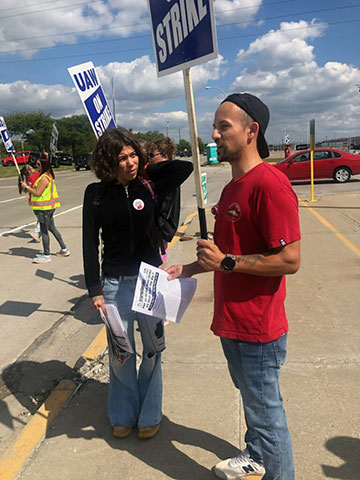 On the picket line at
Wayne, Michigan Ford assembly plant, September 15. (Internationalist photo)
On the picket line at
Wayne, Michigan Ford assembly plant, September 15. (Internationalist photo)For years, UAW workers have been demanding an end to the two-tier system in which workers hired after 2007 (the large majority) get starting pay of only $18 an hour, taking eight years to reach the top rate of $32.32/hour, which is itself outrageously low, not nearly enough for a family. “Temporary” workers start at $16 an hour (or less, at Chrysler) for at least two years. This system, key to the Big 3’s profits (up 65% since 2019), was agreed to by the super-corrupt Administration Caucus that ran the union since the late 1940s, almost three-quarters of a century.
The new leadership of the UAW headed by Shawn Fain is formally calling to end the tiers, and is making a show of openness about negotiations. But it is not mobilizing the ranks for the hard fight it will take to get rid of multi-tier wages that are key to the auto giants’ profitability, and a PowerPoint presentation in a livestream event or on Facebook is not democratic control by the ranks over bargaining. Bottom line: you won’t get rid of tiers by playing nice with the bosses. So don’t be surprised when the UAW tops jettison this key demand as bargaining “gets serious.”
What it will take to defeat the concerted action of the mega-corporations, and the cops, courts and capitalist politicians who do their bidding, is a mobilization of the union ranks in an all-out strike shutting down all the unionized auto plants across the country. The call to end the tier system must be made a non-negotiable demand, and to counter a bureaucratic sellout, auto workers should fight for an elected UAW strike committee, with hundreds of delegates representing every plant and shop, who can be recalled at any time by the members. As we wrote in the 2019 strike:
“key to any real victory is to insist that no one goes back until all go back equal: junk the tier system, make ‘temporary’ workers full-time, equal pay for equal work, now!”
–“For a Big 3 Nationwide Auto Strike!” The Internationalist, September 2019
Forge a Class-Struggle Leadership!
To win against the giant auto/truck corporations will require a struggle in which the almost 150,000 UAW auto workers, with a class-struggle leadership, connect this fight with that of all the oppressed sectors in this rotting capitalist system, and with our sisters and brothers internationally. Back when Detroit was Motor City, it was a powerhouse of the U.S. economy and a center of black culture. But after the 1967 upheaval over racist police repression and the failure of the civil rights movement to alter conditions in the northern ghettos, and the brutal suppression and occupation of black Detroit by the National Guard, the city was devastated.
Still, in the early 1970s, Detroit auto was a hotbed of labor militancy. The League of Revolutionary Black Workers took root in the plants, where many leftist activists were active. Then came the mass layoffs in the economic crisis after the end of the U.S.’ losing imperialist war on Vietnam. All the Big 3 shut their inner-city plants, conveniently getting rid of militant blacks and reds, and as Chrysler filed for bankruptcy in 1979, Democratic president Jimmy Carter stepped in to force union concessions, which the UAW bureaucracy willingly accepted.
As a result, black Detroit south of Eight Mile Road became a ghost town. With the auto plants gone, the city lost its tax base and tens of thousands of black auto workers lost their jobs. Municipal services were gutted. The Democrats had done the dirty work for the capitalist system by keeping the lid on during the urban upheavals of the 1960s and ’70s. As the racist regime of Republican Ronald Reagan went after the unions and black people generally, conditions in Detroit grew steadily worse.
Across the country, and particularly in the industrial heartland of the Midwest, once vibrant cities became a rustbelt of shuttered factories. Many companies shipped their production overseas as Democrats and Republicans embraced the mantra of “free trade” and “globalization.” We are still paying the price for the wrecking job on the black working class that was carried out by the capitalist ruling parties acting in tandem, as the pro-capitalist labor officialdom presided over the destruction of the unions while chaining workers to the bosses through the Democrats.
The bureaucracies that have blocked the power of the organized working class are not simply a bunch of corrupt sellouts, although there are plenty of those. It is a whole social layer, sitting atop the unions while seeking to “mediate” between labor and capital by keeping the workers down. This layer was installed in the late 1940s, as the Democrats spearheaded a “red purge” that kicked out the socialists and communists who had built the industrial unions in the class battles of the ’30s.
During and after the pandemic, the union tops blocked workers’ struggle with “no-strike” contract clauses at a time when they could have forced through their demands as the bosses were desperate to keep the supply chain going. The Wall Street Journal (12 September) reported: “Wages and benefits for nonunion workers were up 15.8% from the end of 2019 through June, compared with a 12.2% gain for unionized workers, according to the Labor Department.” Those figures are a stark condemnation of the sabotage of the unions by the labor bureaucracy.
Recently, as discontent was boiling in the rank-and-file, old-line bureaucrats have been replaced by newer leaders who have been posturing as militants. This was the case of Sean O’Brien in the Teamsters, who once was a vice president in the regime of James Hoffa Jr., and now of Shawn Fain in the Auto Workers. But as shown by O’Brien’s sellout of part-time UPS workers, who are the majority of union members there, installing new tough-talking leaders does not change the role of the bureaucracy in chaining workers to the bosses.
Fain was elected on the slate of Unite All Workers for Democracy (UAWD), which had campaigned for direct election of UAW officers (president and executive board). In this, they were the continuation of the New Directions caucus in the 1980s and Teamsters for a Democratic Union (TDU) which backed O’Brien. Both of these “union reform” groups betrayed workers by running to the bosses’ courts and government to oust the entrenched bureaucracy. Class-struggle unionists condemned this appeal to the class enemy: Labor must clean its own house.
In the case of the UAW, a federal government investigation led to the convictions of more than a dozen union officials, including two former presidents, on charges of embezzlement, kickbacks and collusion as they negotiated sweetheart deals with the Big 3 bosses. This led to a December 2020 consent decree which allowed a direct vote for top UAW officials. The UAWD supported that government control of the union, and even went to court to demand a greater say in selecting the federal monitor who now oversees UAW finances and internal affairs.
Another outfit which has sued the union in the capitalist courts is the WSWS, which we have dubbed the World Scab Web Site, as these fake-leftists have literally sided with the bosses in opposing union recognition in votes supervised by the National Labor Relations Board (NLRB).1 Although these scabs claim that the UAW is simply “a subdivision of the companies,” they ran a candidate, one Will Lehman, for union president in 2022. The WSWS also went to federal court to demand that the government further rewrite the union constitution, election rules and more.
Labor officials installed under the auspices of the capitalist government will never wage the hard-knuckle class struggle needed to defeat the auto bosses. Moreover, the UAW under Fain is appealing to the Democratic Party for support -- the same strikebreaking government party that banned a rail workers walkout last December. Now Biden booster Bernie Sanders is to be the featured speaker at a union rally on Friday.
As for the Republican Donald Trump, he too is an enemy of the workers. The former president when he was in office bragged about how he got General Motors to sell a Lordstown, Ohio plant that it was shutting down to a non-union start-up that would build electric trucks. But the company hardly produced any vehicles, and is now filing for bankruptcy. While Trump works to turn working people against each other using racism, and to set American workers against their sisters and brothers in other countries, it is crucial that striking auto workers in the U.S. appeal for international solidarity action from Mexican workers at Big 3 plants located south of the border.
The UAW is facing enormous challenges, including the struggle to organize non-union plants in the South. A victorious strike against GM, Ford and Stellantis/Chrysler that abolishes the tier system and wins a major pay raise will go a long way to winning that battle. The fight for auto workers’ livelihoods, to escape from the low-wage misery they endure under decaying capitalism, requires forging a class-struggle leadership to oust the bureaucrats, break with the Democrats and all capitalist parties and politicians, and build a workers party, fighting for a workers government and international socialist revolution. ■
- 1. See “How the ‘World Scab Web Site’ Aids the Bosses,” The Internationalist, January 2021.
